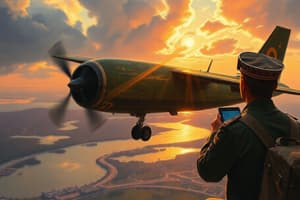Podcast
Questions and Answers
What is the primary responsibility of a pilot during air navigation?
What is the primary responsibility of a pilot during air navigation?
- To fly the aircraft and navigate simultaneously (correct)
- To calculate the fuel required for the flight
- To monitor ground speed and altitude exclusively
- To plot navigation tables and use advanced computing
Which group of techniques is NOT used in air navigation?
Which group of techniques is NOT used in air navigation?
- Visual Flight Rules (VFR)
- Instrument Flight Rules (IFR)
- Surface Navigation Techniques (correct)
- Dead Reckoning (DR)
Before a flight, what is NOT a critical aspect that a pilot must prepare?
Before a flight, what is NOT a critical aspect that a pilot must prepare?
- Planning cruising altitude
- Study of the aerodrome frequencies
- Verification of passenger comfort (correct)
- Forecasted winds
Why is dead reckoning important in air navigation?
Why is dead reckoning important in air navigation?
What does it mean for a pilot to adhere strictly to the flight plan?
What does it mean for a pilot to adhere strictly to the flight plan?
What responsibility does a pilot have in the absence of a navigator?
What responsibility does a pilot have in the absence of a navigator?
Which component is NOT part of the meticulous planning process before a flight?
Which component is NOT part of the meticulous planning process before a flight?
What characterizes air navigation compared to surface navigation?
What characterizes air navigation compared to surface navigation?
What is the primary role of a pilot navigator during air navigation?
What is the primary role of a pilot navigator during air navigation?
Which statement best describes a Great Circle?
Which statement best describes a Great Circle?
What differentiates a Rhumb Line from a Great Circle?
What differentiates a Rhumb Line from a Great Circle?
Which of the following describes a Small Circle?
Which of the following describes a Small Circle?
What defines the Equator in terms of its geometric properties?
What defines the Equator in terms of its geometric properties?
How should the Earth be considered for the purpose of air navigation?
How should the Earth be considered for the purpose of air navigation?
What is the polar diameter of the Earth compared to the equatorial diameter?
What is the polar diameter of the Earth compared to the equatorial diameter?
What is necessary for a pilot to effectively navigate an aircraft?
What is necessary for a pilot to effectively navigate an aircraft?
Flashcards are hidden until you start studying
Study Notes
Air Navigation Overview
- Air Navigation involves guiding an aircraft to a predetermined location at a specific time.
- It is distinct from surface navigation due to the high speed of aircraft and the inability to stop mid-air for position verification.
Pilot's Role in Navigation
- Pilots must navigate independently in the absence of a navigator or in single-seat aircraft, highlighting the necessity for navigation skills.
- Primary responsibility is to operate the aircraft, not to perform complex navigation tasks like plotting and using detailed navigational tools.
Skills Required for Accurate Navigation
- Essential skills include map reading and mental dead reckoning (DR) to ensure precise navigation.
- Attention to speed, altitude, and direction is critical, as variations can lead to significant navigational errors.
Navigation Techniques
- Techniques fall into two categories:
- Visual Flight Rules (VFR): Combines dead reckoning with visual cues from maps, potentially enhanced by radio navigation aids.
- Instrument Flight Rules (IFR): Relies solely on instruments and radio navigation aids, including guidance from radar or air traffic control.
Flight Preparation
- Detailed flight planning includes assessing:
- Maps with appropriate scales,
- Expected wind conditions,
- Cruising altitude,
- Ground speed calculations,
- Flight duration,
- Fuel requirements,
- Available navigation aids at departure, alternate, and destination airports.
In-Flight Navigation
- Adherence to the planned flight path is crucial, especially in featureless terrains or at night.
- Pilots must maintain calculated headings, altitudes, and speeds to avoid getting lost.
Principles of Air Navigation
- Successful air navigation ensures safe and lawful travel without risks to those on board or individuals on the ground.
Earth Geometry and Navigation
- Earth's shape is an oblate spheroid, with a polar diameter 23NM less than the equatorial diameter of 6884NM.
- For navigation purposes, Earth is treated as a perfect sphere with imaginary lines for simplification.
Key Navigation Lines
- Great Circle: Cuts Earth into two equal halves, such as the Equator and meridians.
- Small Circle: Divides Earth into unequal parts and does not pass through the Earth's center, e.g., parallels of latitude.
- Rhumb Line: A curve intersecting all meridians at the same angle, leading to the poles except at 90 or 270-degree tracks.
Key Features of the Earth
- Equator: A significant great circle that separates the Northern and Southern Hemispheres, perpendicular to the Earth's axis of rotation.
- Earth's Axis: Vertical line connecting the North and South Poles, essential in determining the Earth's orientation.
Studying That Suits You
Use AI to generate personalized quizzes and flashcards to suit your learning preferences.




